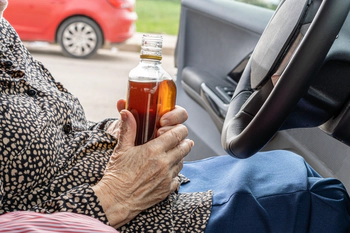Senior Citizens at High Risk for Harm from Driving Drunk, Why Don’t Public Health Campaigns Address This?
Most public health campaigns regarding drinking and driving target young and middle-aged adults. However, recent research showing a higher rate of seniors getting into alcohol-intoxicated accidents suggests public health campaigns around alcohol and driving should address all age groups.

According to the National Institute on Alcohol Abuse and Alcoholism, about 13,000 Americans die in drunk driving accidents every year, with alcohol intoxication causing about 31% of all driving fatalities in the U.S. A public health crisis in its own right, drunk driving is widely studied and examined with significant efforts directed at preventing it. Recent research into the nuances of drunk driving and the demographics most affected by it revealed senior citizens are responsible for a higher rate of alcohol-related car accidents than the general public.1
What the Findings Show
Researchers in the social and behavioral sciences division at the University of Memphis School of Public Health in Tennessee came to an alarming finding regarding drunk driving and America’s elderly. Older drivers across America using alcohol or drugs are much more likely to be at fault in a crash that involves their car and another car. While it has been known for some time that older drivers are statistically more likely to be involved in all types of auto accidents than middle-aged adults are, this study showed for the first time that older adults who drink or use drugs increase their risk of causing a car accident by at least two to four times.2

The researchers examined a randomized sample of more than 87,000 drivers involved in crashes between two moving vehicles. Over one-third of them were drivers over 70 who tested positive for substances. Those findings are alarming because drivers over 70 do not comprise one-third of all drivers on the road, suggesting older Americans are disproportionately more likely to be involved in an alcohol or drug-related driving accident.
Even when the researchers adjusted for other factors like road grade, weather, light, distraction, and speeding, older drivers with substance impairment were still twice as likely to cause a car-on-car accident. “In general, older drivers are at an elevated risk for being at fault in a fatal car crash; this is especially the case when they are under the influence of alcohol or drugs,” said Dr. Satish Kedia, the study author. “Our research shows just how much aging increases the risk of being at fault for injury or fatality in a drug- or alcohol-related traffic accident.” To reinforce the severity of their findings, researchers wrote in their conclusion that 7,500 senior citizens died in car crashes in 2020, with many of those incidents involving alcohol or drug intoxication.3
While all forms of drinking and driving (and drug use and driving) are dangerous and should not be done, it seems these activities affect seniors worst of all, making them much more prone to car accidents.
Risk Factors Senior Citizens Face
Senior citizens face many factors that may put them at risk for drinking or using drugs. For example, seniors are more likely to take several medications, and they might not know how those medications and alcohol will interact. Some older adults may look to substances as a coping mechanism for dealing with big life changes such as retirement, grief, loss, declining health, or a change in living situation. Older adults may take medications for pain, or they may drink alcohol to be social with other adults their age. In these instances and others, any exposure to mind-altering substances puts older adults at risk of developing an addiction.
The Importance of Prevention, Education, and Checking in with the Elderly

There are several ways drunk and drugged driving accidents among older people could be prevented. Policymakers could utilize common-sense steps like more frequent license renewal after a certain age, along with in-person vision and knowledge tests to ensure seniors are still up to the task of driving. Public health campaigns could be created and directed toward senior citizens, encouraging them to minimize or eliminate their intake of mind-altering substances. Doctors speaking with their senior patients about alcohol, drugs, medication, and interactions between the three could also go a long way in helping seniors stay sober and clear-minded. Strong laws around drunk driving checkpoints and sobriety checkpoints could also help.
In addition to the above prevention efforts, broad public education is critical in stopping drunk and drugged driving before it even occurs. As the human body ages, it becomes less capable of processing alcohol. And as people age, their alcohol tolerance will likely recede, and they may not realize that just one drink is too much. Ensuring seniors have a way to become educated about such issues is critical in keeping seniors (and others) safe on the road.
Finally, it is important to check in with seniors. The aging process can be challenging, confusing, painful, stressful, and depressing. Seniors may choose to self-medicate on their prescriptions, drink alcohol, or use illicit drugs to cope with transitioning from adulthood to old age.
When a Person Is Beyond Prevention and Education, Addiction Treatment Helps Them Overcome Addiction
Drug and alcohol addiction are critical, life-threatening afflictions that can affect anyone regardless of age, sex, income level, demographic, ethnicity, or geographic location. While senior citizens do not abuse drugs and alcohol at the same rate as adults, their usage rates are increasing with each passing year, according to NIDA. Given Americans’ concerns for the health and vitality of their senior loved ones and friends and the need to keep roads safe, seniors who struggle with addiction must receive help.4
If you have a grandparent, uncle, aunt, parent, or if you know someone who is a senior citizen and who you suspect is using mind-altering substances, please help them find and enter quality residential addiction treatment as soon as possible.
Sources Cited:
-
TIP. “Driving under the influence of substances and motor vehicle fatalities among older adults in the United States.” Traffic Injury Prevention, 2023. tandfonline.com ↩︎
-
USNews. “Drinking & Driving in the Senior Years: A Recipe for Disaster.” U.S. News, 2023. usnews.com ↩︎
-
NIAAA. “Alcohol’s Effects on Health.” National Institute on Alcohol Abuse and Alcoholism, 2023. niaaa.nih.gov ↩︎
-
NIDA. “Substance Use in Older Adults DrugFacts.” National Institute on Drug Abuse, 2020. nida.nih.gov ↩︎






 ®
®